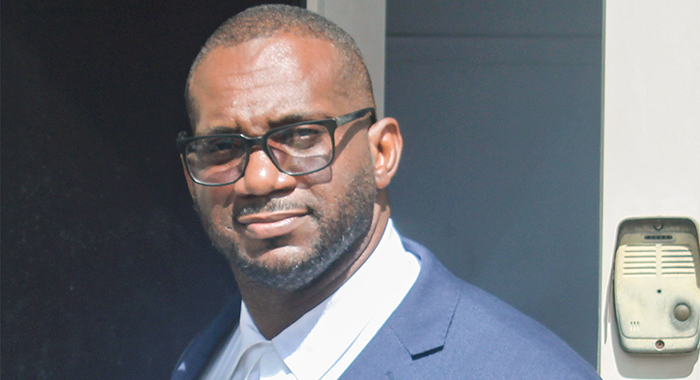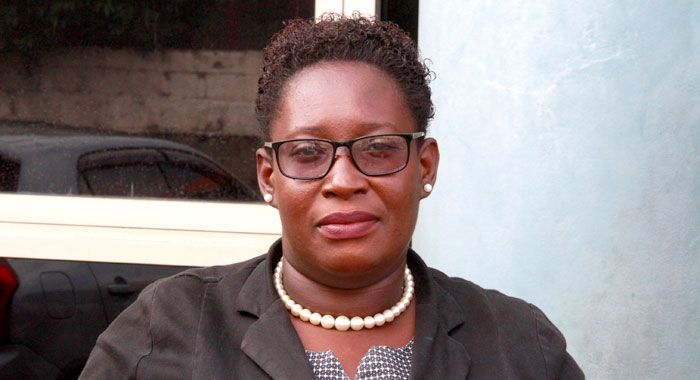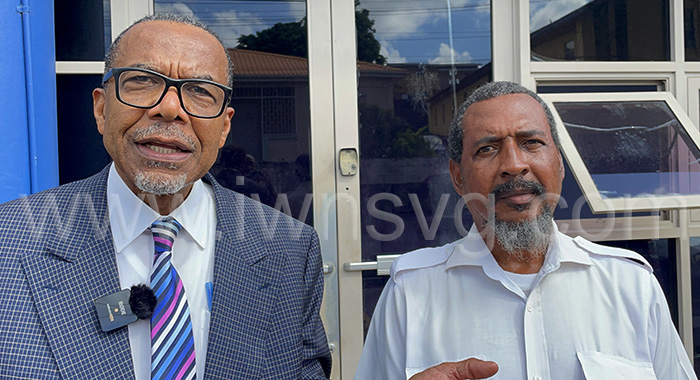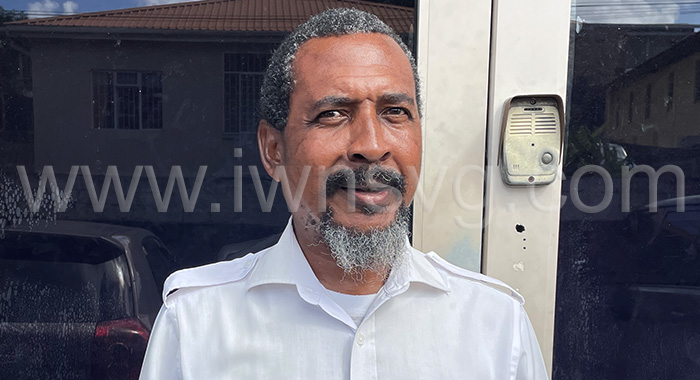Kingstown Magistrate John Ballah, on Friday, dismissed a 2022 protest-related charge against a Customs officer who held up a placard in Kingstown during a protest against the COVID-19 vaccine mandate which came into effect in December 2021.
Ballah ruled that the prosecution had not provided any evidence to support the charge that the accused, Dave Crosby, 54, of Cane Garden, had organised, promoted, led, or addressed the Jan. 14, 2022 protest, as the prosecution alleged.
Crosby was charged under section 10 of the Public Order Act, which gives a police officer the power to require anyone who is addressing or addressed a meeting taking place within 200 yards of certain premises, or who is or appears to the police officer to be an organiser or promoter of it, to disperse.
In handing down his ruling, Ballah said there were legal issues that the court feels were not addressed by either the prosecutor or defendant.
“The prosecution almost alluded to it. Those issues, I believe, are important to the matter. It is whether or not a protest falls under the Public Order Act. The Public Order Act clearly speaks to meetings and processions,” the magistrate said.
The magistrate said that from his research, processions are marches and in order to have a procession, notice must be given to the commissioner of police, but not to ask for permission.
“The notice must be given and the commissioner would respond in writing as to whether or not the route is viable,” Ballah said.
“If the commissioner of police says it is not a viable route, he will give an alternative route. If the procession fails to follow the alternative route given by the commissioner, they are in breach of the legislation.”
The magistrate said the legal issue is whether a group of people standing outside the Parliament constitutes a meeting.
“Nobody answered that. The court will not answer that,” Ballah said.
He pointed out that the defence had highlighted the lack of evidence that Crosby was a leader, coordinator or someone who addressed the meeting.
“The first hurdle is whether there was a meeting. Nobody addressed that. The next hurdle was whether he addressed the meeting,” the magistrate further said.
Ballah said the court did not think that Crosby holding and showing a placard amounted to him addressing a meeting.
He said that while in holding the placard Crosby was showing that he was protesting, it did not amount to an address.
“What is important is whether the prosecution led evidence that he was a leader. No such evidence was led.”
He said that the issue of where Crosby was properly arrested “was neither here nor there”.

Ballah, who served two decades as a police officer before retiring and being appointed a magistrate, said an arrest can be constructive.
“So if I am a police and I saw to my clerk, ‘You are under arrest’ or ‘Come with me; let us go’ and I am taking her to the station and … she feels in her mind she is arrested because once she is at the station she does not move, because she thinks if I move, I am obviously resisting arrest, she is under arrest.”
Ballah said he therefore did not see as of great importance the issue of whether Crosby was arrested or detained.
“The defendant clearly realised that he was under arrested. He went with the police, he sat in the station, he waited until the next day when corporal Patrick informed him of the office,” Ballah said.
The magistrate, however, ruled that the lack of measurement was an issue.
“While the man on the street can tell you the market is under 200 yards from the court house, the police should have taken some measurements,” he said, adding that if the police had taken measurements, it would have been clear or cogent.
He said that while Crosby gave that admission and the court accepted the admission, it would have been more prudent for the police to take the measurement.
Ballah said he could speak to the legislation clearly because of the number of lectures he has given on it, presumably to his colleagues when he was a police officer.
“What would have been more appreciate to charge him under is section 12,” he said, adding that had the charge been brought under that section, there would have been no need to show that he was the leader or organiser.
“One only needed to show that he participated in the public meeting and there are cases that suggest that a protest falls within the ambit of a public meeting,” Ballah said.
“The most appropriate charge would have been section 12. In light of these deficiencies, I am not saying the police may have been wrong or right but in light of these deficiencies, the matter must be dismissed,” Ballah said.
In summarising the case for the Crown, the prosecutor, acting Corporal of Police Corlene Samuel reminded the court of the evidence of Station Sergeant of Police Julian Caine.
Caine testified that on Jan. 14, 2022, about 1:50 p.m. Parliament was in session and he was dispatched to the area of the High Court Building where protesters had gathered.
Caine said he went to the group of people who were directly in front of the gate at the time.
The officer testified that when he spoke to protesters, Crosby refused to move.
At that point, Caine went to Crosby, spoke to him and asked him to move, but Crosby refused, Samuel told the court.
Caine asked Crosby again and when he refused Caine called the junior officers and told them to detain Crosby and take him to the police station, which they did.
An officer, whose name Samuel gave only as Browne, testified that when he spoke to Crosby, the defendant responded, “We’re not moving. We are protesting.”
Samuel said:
“He (Crosby) was there. He made a speech. ‘We are not moving; we are protesting.’ He refused to move when Station Sergeant Caine told him to move and at that point, Caine instructed him and another officer to take him to the station, which he did.”
Samuel told the court that Corporal Patrick, the arresting officer, gave evidence that he was at the station when the officer brought Crosby.
The following day, Patrick cautioned and interviewed Crosby, who said nothing.

Samuel said Patrick charged Crosby under section 10(2) of the Public Order Act. The charge was read to him in court and he pleaded not guilty.
“So, he is aware of the charge,” the prosecutor said and read the charge to the court.
“Prosecution is saying when police went there and spoke to the crowd, the defendant took his card, he addressed the public procession that was going on. ‘Listen, we are not moving; we are protesting’,” Samuel argued.
She told the court that the procession took place right in front of the High Court Office. It was within 200 yards. He admitted that he was 100 feet away from the gate. The police were in their right to ask him to move. And when he refused at that point, he committed an offence. That is what the prosecution is saying.
“There was a protest action, … a planned protest action which he agreed was going on, which is also referred to as a procession. And that time he was arrested and taken to the station. Whether we want to use the word “detained”, what happens initially before a formal arrest is made is that you are detained. So, he was arrested and taken to the station where he was formally charged and brought before the court where the charge was read to him.
“Prosecution is saying all elements of the offence have been made out [and is] asking that the defendant is found guilty of the offence of failing to disperse when asked to do so by a police officer.”

However, defence counsel Michael Wyllie argued that the charge against his client should be dismissed, saying there was no evidence that his client addressed the meeting, was leading or organised or was a promoter of it.
“When he came from Bequia in the morning, they were already assembled, and he testified that the protest card he got was from a group of cards that they had there at the scene,’ Wyllie reminded the court.
He noted that his client was initially charged under section 8 of the Public Order Act, which speaks to organising and holding public meetings.
“There was absolutely no evidence to substantiate the charge under section 8 and when he came to court, the prosecution made an application that the charge be changed to section 10… There is no evidence to convict the defendant under section 10,” Wyllie said.
“So, this charge — he should not have been charged at all in this matter.”
Wyllie also argued that his client was never arrested at the scene.
“He was just detained for investigation,” he said, adding that the police were not even sure that they had detained the right person.
“He never spoke to the defendant. The defendant was never part of the group that was in front of the Parliament building.”
Wyllie said another legal issue that warranted the dismissal of the matter is that the police should have investigated the distance from the Parliament building to where Crosby was standing.
“There is no measurement that it was 200 yards. So, this is clearly a simple matter to dismiss. He is clearly not guilty of the offence because he is not any of the persons described under section 10 and there is no measurement as to distance that he was outside of the court,” Wyllie told the court.







Anything easy the police can do, but sadly enough they cannot catch harden criminals who are roaming the streets, and killing people what a shame on the so called POLICE
Collin John yo left a legacy of illegality!
I share the same sentiments Jim . Every day someone life has been taken away suddenly due to the high level of crimes in SVG but yet still police failed to swipe out those bandits roaming the entire street of SVG. A little protest few decent vincentians Citizens protesting those bunches of fool uneducated thick skull and yard slaves officers knows how to go harassing the life out of the citizens there .